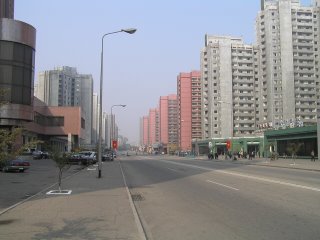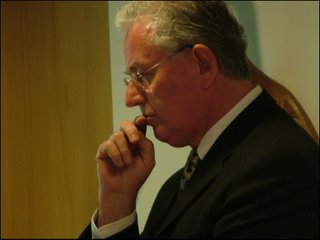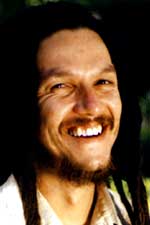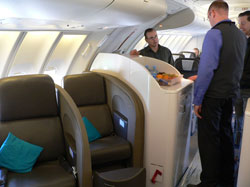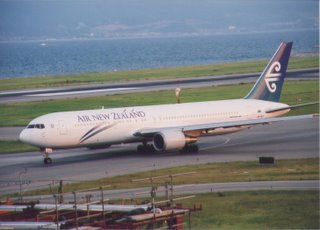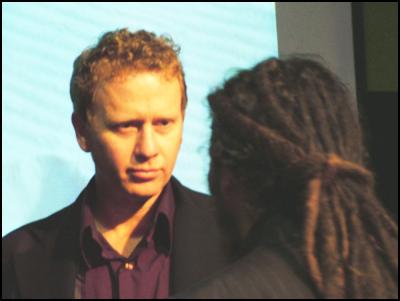
Yesterday I described how Russel Norman’s speech of 4 June on becoming Co-Leader was intellectually vapid on matters like “resources running out” and the evil of roads.
.
Today I’m going to attack his view on the World Trade Organisation (WTO). To his credit he describes largely accurately what the WTO commitments mean, something Sue Kedgeley never seemed to get her head around. I described this in a previous post, and it means quite gloriously that local content quotas on TV and radio are against government treaty commitments that are not easy to get out of. Officials told Labour this when it got elected, and the National Government that signed up to those commitments knew it at the time - the problem is that leftwing Labour didn't want to listen, but eventually had to accept it.
.
Russel said:
.
“The commitments that these parties have made under the World Trade Organisation are drawing a tighter and tighter net around the capacity of national governments to act in the interests of their citizens. And they are limiting the ability of governments to act in a sustainable manner.”
.
In other words, he is complaining that WTO commitments restrict governments on interfering with the voluntary transactions of citizens engaging in trade and investment across borders. The “interests of their citizens” is actually the interests of those who produce inefficiently, wasting labour, capital, energy and land to produce something that consumers are not willing to buy, without prohibitions or taxes on the competing products. This means putting up the price of goods and services, or even prohibiting the trade in goods and services that sellers and buyers are willing to trade in. There is no sustainability in protecting industries where, basically, not enough people are willing to buy enough of their products to keep them going, without state intervention. The WTO binds countries to open, transparent trade and to reducing the barriers to free trade – this is ENTIRELY in the interests of their citizens, because they are able to produce, sell and buy freely, without Russel sticking his beak in the way. He can buy "fair trade" goods, or good certified to be environmentally friendly if he likes - all of those schemes are voluntary, and fine for those wishing to sell and buy them, at a premium. No force involved.
.
Russell then said “In the 1990s the National Party Government made commitments to the WTO under the audiovisual services section of the General Agreement on Trade in Services. Now this rather obscure commitment means that the New Zealand government can no longer introduce compulsory New Zealand content quotas on radio and television without being in breach of its WTO commitments. And these WTO commitments are effectively irreversible within the WTO rules because any country which tries to withdraw trade liberalisation commitments must compensate every other country in the world that thinks it may suffer somehow as a result.”
.
He’s absolutely correct. Not only that, but New Zealand has similar commitments under CER with Australia. Unlike Russel, I think this is good. It protects New Zealand television and radio stations from state enforced control of what they broadcast.
.
He continues "So when the Labour-led Government came into power in 1999 they sought to implement mandatory minimum New Zealand content quotas on radio and television. They had promised to do this in the election campaign and such local content quotas are very common around the world as countries seek to defend their cultural identity. But the new government was told by their officials that they could not without breaching their WTO commitments. They were forced to back down.
.
Russel said:
.
“The commitments that these parties have made under the World Trade Organisation are drawing a tighter and tighter net around the capacity of national governments to act in the interests of their citizens. And they are limiting the ability of governments to act in a sustainable manner.”
.
In other words, he is complaining that WTO commitments restrict governments on interfering with the voluntary transactions of citizens engaging in trade and investment across borders. The “interests of their citizens” is actually the interests of those who produce inefficiently, wasting labour, capital, energy and land to produce something that consumers are not willing to buy, without prohibitions or taxes on the competing products. This means putting up the price of goods and services, or even prohibiting the trade in goods and services that sellers and buyers are willing to trade in. There is no sustainability in protecting industries where, basically, not enough people are willing to buy enough of their products to keep them going, without state intervention. The WTO binds countries to open, transparent trade and to reducing the barriers to free trade – this is ENTIRELY in the interests of their citizens, because they are able to produce, sell and buy freely, without Russel sticking his beak in the way. He can buy "fair trade" goods, or good certified to be environmentally friendly if he likes - all of those schemes are voluntary, and fine for those wishing to sell and buy them, at a premium. No force involved.
.
Russell then said “In the 1990s the National Party Government made commitments to the WTO under the audiovisual services section of the General Agreement on Trade in Services. Now this rather obscure commitment means that the New Zealand government can no longer introduce compulsory New Zealand content quotas on radio and television without being in breach of its WTO commitments. And these WTO commitments are effectively irreversible within the WTO rules because any country which tries to withdraw trade liberalisation commitments must compensate every other country in the world that thinks it may suffer somehow as a result.”
.
He’s absolutely correct. Not only that, but New Zealand has similar commitments under CER with Australia. Unlike Russel, I think this is good. It protects New Zealand television and radio stations from state enforced control of what they broadcast.
.
He continues "So when the Labour-led Government came into power in 1999 they sought to implement mandatory minimum New Zealand content quotas on radio and television. They had promised to do this in the election campaign and such local content quotas are very common around the world as countries seek to defend their cultural identity. But the new government was told by their officials that they could not without breaching their WTO commitments. They were forced to back down.
Had they proceeded they could have faced action taken against New Zealand in the WTO by countries that sold television programs into New Zealand, like the US, claiming that their television production companies were being discriminated against by this New Zealand content quota, in beach of New Zealand's WTO commitments, commitments remember that were made by the previous National Party government”
.
Actually Russel, they are not “very common around the world”, you see them in Australia, Canada and France. The UK does not have them, nor does the USA and most other countries are confident enough of their local culture (and often language) that the government see little need. Otherwise he is correct.
.
“The National Party government made WTO commitments that effectively bind all future governments and parliaments and prevent them from introducing minimum New Zealand content quotas on radio and television. A new government was elected on a platform of introducing local content quotas but were told they could not because of the commitments of a previous government. And if they had proceeded anyway, then trade lawyers meeting in secret in Geneva would have told us to change our law or face trade sanctions. This is not conspiracy theory this is actually how trade law and the WTO actually works.”
.
It’s called a treaty Russel. Labour enters into treaty commitments too, and New Zealand has commitments under the Nuclear Non-Proliferation Treaty (NPT) that stop it acquiring nuclear weapons (one Russel probably supports). Now, I’m not advocating that this should change – but this is binding, and New Zealand would have to formally withdraw from the NPT (like North Korea did) to develop nuclear weapons. New Zealand could do two things to introduce quotas, either liberalise other areas of trade to compensate (e.g. eliminate all tariffs immediately), or formally withdraw from the WTO. I suspect Russel would support the latter, and not give a damn that other countries could block our products in “their citizens’ interests”. The Green movement in the UK for example sells the nonsense that it is better to buy local produce instead of food or wine from New Zealand, because of the distance they travel – ignoring how unsustainable much European agriculture is through subsidies.
.
Russel then follows on with a non-sequitur that:
.
"Now if we are to avoid the fate of the Easter Islanders then we need international environmental treaties that empower governments to discriminate on the basis of how products are made - that is whether they were made in an environmentally harmful way or not. But currently if governments do this then the WTO will rule against them in the same way that they would rule against New Zealand if we tried to introduce mandatory minimum New Zealand content quotas."
.
Now hang on. The fate of the Easter Islanders? Oh yes, he described the old Rapa Nui society that worshipped statue building, fell all of the trees and then embarked on civil war because they consumed more than they produced. Pretty much true too. That story in itself says a lot about a society with no property rights (according to some Green supporters, property rights are just a social contract which some libertarians worship), so no wonder that happened. The tragedy of the commons was all too evident, as a native people besotted with worshipping that which is not real (cult of the statue), did not trade and exchange value and manage scarce resources (the management of scarce resources is called economics – something the Greens are sceptical about because they know so little about it). So no wonder trees went to the first comer, nobody maintained land for wood, fruit or hunting and a culture of pillage was the order of the day. This has nothing to do with free trade or the WTO, and everything to do with primitive people with no concept of trade, contract and property rights. Remember, the Greens are rarely advocates for property rights, and usually opponents.
.
So besides his example of Easter Island being completely wrong, he then advocates treaties that prohibit products or services if they were made “in an environmentally harmful way or not” or which are made in sweatshops. Well for starters, the example of the WTO commitments on free trade on audio-visual services can’t by any rational stretch of the imagination have anything to do with the environment or sweatshops. The entertainment industry (TV, radio, music) is hardly a sweatshop industry, in fact it is the opposite. It is full of people well paid living a dream career – to protect New Zealanders doing this from people overseas is sheer nonsense. Not only is it nonsense, but offensive. By what right does any government dictate what a privately owned broadcaster must play or not play in terms of music or TV programmes? Privately owned broadcasters are NOT owned by the state – and must be free to broadcast whatever programmes they wish, as long as they are not defamatory or involve anyone coerced to participate. The Greens, however, think New Zealand music is special, and that despite New Zealanders NOT wanting to listen to more of it (the ratings of Kiwi FM are a testament to that), the Greens want to force radio stations to play something to people who don’t want to listen.
.
Bullies.
.
New Zealand’s audiovisual sector commitments secure a level of free trade in music, movies and television programmes that is admirable. New Zealanders are not forced to watch or listen to anything, and broadcasters are not forced to programme what the state thinks it appropriate. Local content quotas are about protecting people who are some of the most fortunate in society, working and earning a living through the entertainment industry. If they can’t generate an audience on their own behalf, then a quota is merely protecting mediocrity over talent – another form of welfare.
.
Beyond that, there is another argument about whether free trade should be limited by government restrictions on importing goods or services from countries with poor environmental or labour records (define those please) – that’s another issue. I will come to that another day.
.
However, just as he failed to understand that oil wont run out, cars wont disappear and roads are not going to be empty, Russel tenuously linked a primitive culture that failed due to lack of property rights (Easter Island), New Zealand’s WTO commitments on audiovisual services and foreign producers with poor environmental records. Not a good start.
Russel Norman's speech
Radio quota bluff
Kiwi Fm you didn't listen to it, so now you pay for it
WTO website search engine to find specific commitments

